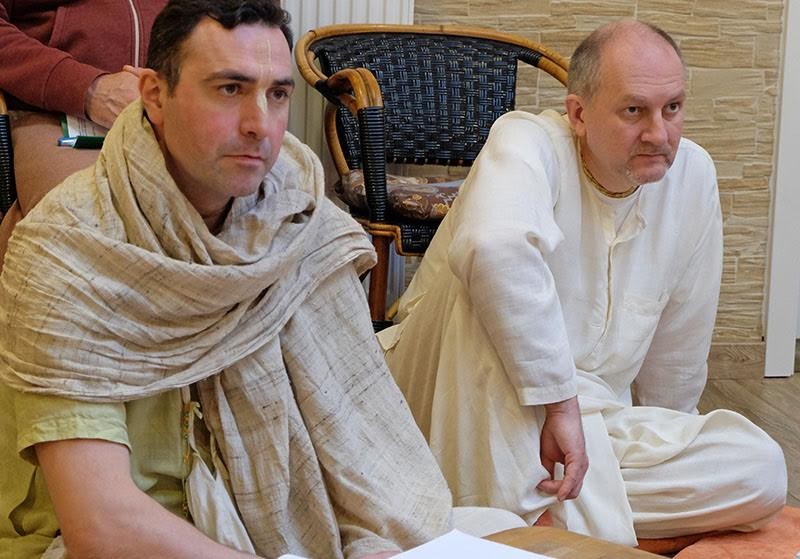Giving and Accepting Shelter





By Devaki Devi Dasi
Over the Easter holidays we conducted a four-day retreat in the Cologne temple with the topic of “Giving and Accepting Shelter”. It was the first time for the devotees to host such kind of event. Around 25 to 30 devotees had assembled for four days to receive insights into this deep and so relevant theme, which accompanies us throughout our entire spiritual life. Giving and accepting shelter is the very essence of spiritual practice: we are ongoingly endeavoring to take shelter – in the holy name, in Guru, Krsna and the Vaisnavas. And we are meant to qualify ourselves more and more in order to reach out to others and give shelter. It is interesting to understand how the principles of giving and accepting shelter are connected to culture. Jiva Goswami expresses this in the Madhava Mahotsava: “Though one usually ignores others in attaining one’s goals, those aspiring for prema accept dependance on others with similar goals and tastes. Thus, cooperating with each other, they worked together keeping in mind the goal of prema.”
In material life and its culture, where sense gratification is the goal of life, people ignore each other or even push each other down and out of their way. The survival of the fittest, as we call it. Competition and envy enters the relationships, which are superficial and have a business deal mentality, based on sense gratification: I scratch your back, you scratch mine. There is a lack of respect and selfless service mood towards each other. Everyone is focused on their own schedule and very busy, hardly willing to sacrifice time for others. Relationships are impersonal and self-centered, and a higher standard of life gives the illusion of independence and freedom.
In spiritual life and its culture, where self realization is the goal of life, things are quite the opposite: people like to accept internal dependance on others who have a similar mood and taste. Relationships are based on respect and selfless service towards each other, and it is most natural for seniors and more experienced persons to reach out to youngers to affectionately uplift them. And it is most natural for juniors to offer respect and service to seniors and inquire from them in submission in order to receive guidance. And thus the relationships are deep and meaningful.
Garuda Purana explains: “One cannot be liberated without association with a pure devotee of the Lord. And unless one shows mercy to those in an inferior position, one’s life will be superficial.” And not only one’s life, but one’s relationships as well.
Material relationships are based on sense gratification. As devotees, we want to eliminate this basis, but unless we replace it with something higher, there will be a vacuum in our relationships. We have to replace sense gratification with the principles of giving and accepting shelter. Only then our life and our relationships will become deep and meaningful. Otherwise we will simply surround ourselves with “haribol-relationships”: exchanging small-talk, and lots of ‘haribols’. Talking about ourselves, instead of inquiring from seniors and more experienced devotees.
We can clearly observe this in our communities. As soon as we cultivate this mood of giving and accepting shelter, then relationships become deep and meaningful. But if this is not there, then we have a rather impersonal atmosphere, where devotees are simply busy with themselves and their services, running past each other. Unless we come to the point in our spiritual development, where we genuinely and selflessly want to reach out to others and uplift them, we remain kanistha: simply focusing on ourselves. There is such a thing as so-called spiritual selfishness: my sadhana, my service, my schedule, my trip to India, my reading time – mine, mine, mine….! It is still selfishness, even though employed in Krsna consciousness.
The main two keys for community development are the following: moving the Deities of the Community in the very center of our lives, and cultivating giving and accepting shelter amongst the devotees. Only the Deities being the center will not be enough. It still leaves room for impersonalism amongst the devotees. After all, Krsna says: “Not he is My devotee who claims to be My devotee, but he who claims to be the devotee of My devotee
– he is My real devotee.” Service to the devotees attracts Krsna’s attention. And what better way is there to serve devotees than giving them shelter, guidance and inspiration to move forward in their spiritual life?!
Bhaktisiddhanta Sarasvati Thakur’s states in Amrta Vani: “One who gives personal instruction to each and everyone does more for others than the platform speakers do. Generally, whatever platform speakers say cannot solve the problem of everyone in the audience, nor can it always benefit every individual. A person’s defects are better rectified in a private tutorial class or private coaching than in hearing lectures in a school or college. Therefore those who instruct particular persons separately can award them something more permanent.”
It is noteworthy that even Bhaktisiddhanta knew the term ‘coaching’. And his statement expresses very clearly how important it is to have such aloof brahminical adviser, who has no other interest except helping us to improve ourselves. Simply hearing lectures might not always be so effective in this attempt.
One may wonder what precisely the characteristics are of a sheltering relationship? What is the deeper meaning of being sheltered? It means there is a senior, confidential friend and well-wisher in our life, who we can fully trust and confide in. This person is a role model for us and is able to give inspiration and guidance. We can see qualities in him/her which we are striving to also develop. We can share our innermost struggles, fears and shortcomings with this experienced friend, knowing very well that he/she has no other interest except helping us in our spiritual growth and development. No financial interest, no emotional interest – even no managerial interest.
Sometimes managerial interests and needs of a project can clash with our personal interest as struggling sadhaka. This is not meant to be a criticism of our managers. Being a manager is a tough service – no doubt. And one’s vision can easily be clouded by managerial goals and needs. This is exactly why in former times the kings always had an aloof brahminical advisor – a Chanakya Pandit, who would give directions. Prabhupada expresses this in the purport to SB.2.7.9: “The brahmanas, by their learned labor of love, would instruct the administrator-king’s how to rule the country in complete righteousness, and thus the process would go on as a perfect welfare state.” This principle is also there on the level of our yatras. It is a very important part of brahminical culture – the need for an aloof brahminical adviser, which is the main function a brahmana is meant to play. A true brahmana is not interested in title, position, power, control or money. He simply keeps aloof and gives learned advice, so everything goes on for everyone’s ultimate welfare as spirit soul, progressing towards Krsna.
Not only administrator-king’s need such aloof brahminical advisor, but we all do. As long as we have some material desires and attachments, we cannot objectively assess ourselves. Our vision of ourselves is clouded, and too easily we cut corners and disregard aspects of spiritual practice which might infringe on our sense gratification or material attachments.
It has taken me many years to understand why sometimes devotees experience the feeling of “being used” or even “exploited”. Initially my reaction to such complaints was that this is nonsense, or simply maya, as we are serving Krsna, and He always accepts our service and thus we get so much spiritual benefit. However, only recently it dawned upon me that there are more subtle aspects to it. We can indeed easily feel used or exploited, if we don’t have such sheltering relationship in our life – a person who has absolutely no other interest except helping us in our spiritual development. Sometimes this vision of seeing a person’s spiritual need might get lost, and devotees can merely be viewed in terms of manpower to cover services, or as a source of donations and income. And this vision and attitude can make us feel used. We don’t feel cared and valued as individual spirit souls with spiritual needs, ongoingly endeavoring on our path home, back to Godhead. And then we usually don’t stay for very long in a project, but go somewhere else. However, we can not blame our managers. We ourselves have to recognize the need for sheltering relationships, and we have to eagerly desire them. Then Paramatma will witness this desire and will send along the perfect person at the right time, who can give us shelter.
When we are able to attract the interest of a senior Vaisnava in our spiritual development we receive true mercy. This is what it means to get the mercy of a Vaisnava – to receive this merciful glance and interest in our spiritual progress. His/her willingness to selflessly reach out to us and guide us. And our advancement is indeed dependent on such relationships.
At the concluding session of our retreat devotees shared how this seminar had finally given them some clear goals and targets to work towards, in order not to become stagnant, but rather ongoingly grow and spiritually develop themselves.
For more information on this topic please see the recordings on www.therootsofspiritualculture.net
Your servant, Devaki dd
Comments
Hare Krishna!